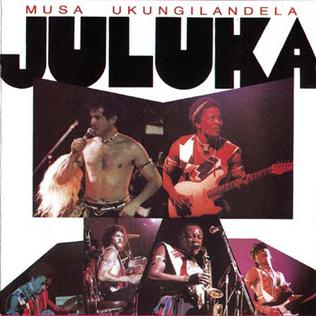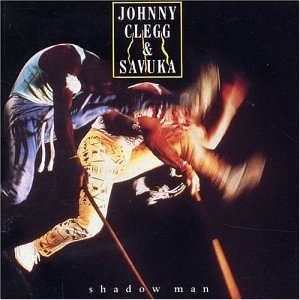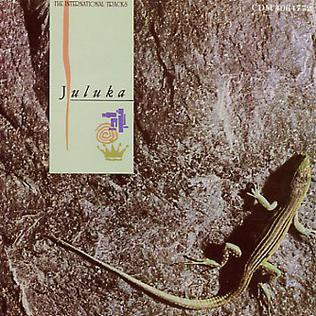
Jonathan Paul Clegg, was a South African musician, singer-songwriter, dancer, anthropologist and anti-apartheid activist.
Maskandi is a form of Zulu folk music, originally associated with migrant workers, that is evolving with South African society. Thought to be pioneered by Phuzushukela. Often characterised by a picking guitar style which draws on a variety of historical influences it also has an important social function with players being given sanction to publicly criticise powerful people.

Musa Ukungilandela is a studio album from Juluka, a South African band led by England-born Johnny Clegg and the Zulu Sipho Mchunu.

Shadow Man is the second studio album from South African artist Johnny Clegg and his band Savuka.

Simon "Mahlathini" Nkabinde was a South African mbaqanga singer. Known as the "Lion of Soweto", Nkabinde is the acknowledged exponent of the deep-voiced, basso profundo "groaning" style that came to symbolize mbaqanga music in the 1960s. Nkabinde was also a very active live performer in South Africa, recording and performing with the Mahotella Queens and the backing Makgona Tsohle Band from 1964 to 1971, and then again from 1983 to 1999. The Mahlathini and the Mahotella Queens act was propelled into international stardom in the wake of Paul Simon's 1986 Graceland album.
Juluka was a South African band formed by Johnny Clegg and Sipho Mchunu. Juluka means "sweat" in Zulu, and was the name of a bull owned by Mchunu. The band was closely associated with the mass movement against apartheid.

Savuka, occasionally referred to as Johnny Clegg & Savuka, was a multi-racial South African band formed in 1986 by Johnny Clegg after the disbanding of Juluka. Savuka's music blended traditional Zulu musical influences with Celtic music and rock music that had a cross-racial appeal in South Africa. Their lyrics were often bilingual in English and Zulu and they wrote several politically charged songs, particularly related to apartheid. Some better-known Savuka songs include "Asimbonanga", and "Third World Child", from their 1987 album Third World Child. Band percussionist Dudu Zulu was killed in 1992; their song "The Crossing" was a tribute to him.

Ubuhle Bemvelo is a studio album from Juluka, a South African band led by Johnny Clegg and Sipho Mchunu. It was first released in 1982.
Robert Edward Jansen was a South African musician. He was born in Cape Town, South Africa.
Sipho Mchunu is best known for his work in the band Juluka from the 1970s to the 1980s.

Scatterlings is a studio album by Juluka, a South African band led by Johnny Clegg and Sipho Mchunu. It was released in 1982.

South Africa has a notable jazz scene.

African Litany is the second studio album from South African band Juluka, released in 1981. It features lyrics sung in English and Zulu.

The International Tracks is a 1984 EP collecting various singles and remixed tracks by Juluka, a South African band led by Johnny Clegg and Sipho Mchunu. The songs on this album had all been previously released internationally but not in South Africa; hence the title. The cover is the same as Stand Your Ground but with a slightly different track listing, including two dance mixes and excluding four songs previously released on the 1983 album Work for All.

Work for All is a studio album from Juluka, a South African band led by Johnny Clegg and Sipho Mchunu. It was first released in 1983 and rapidly achieved major success in South Africa where it is now remembered as a classic album in the history of South African music.

The Good Hope Concerts is a live album from Juluka, a South African band led by Johnny Clegg and Sipho Mchunu. It was first released in 1986. It was recorded at the Good Hope Centre in Cape Town. The concerts were Clegg's first major successes in Cape Town and were promoted by local record label Mountain Records.

Crocodile Love is the final studio album from Juluka, a South African band led by Johnny Clegg and Sipho Mchunu. It was first released in 1997. It was entitled Ya Vuka Inkunzi - The Bull has Risen in South Africa.

Stand Your Ground is a 1984 album by Juluka, a South African band led by Johnny Clegg and Sipho Mchunu. The album was distributed by Warner Bros. Records in select countries of Europe and the Americas. The album debuted four new Juluka songs: "Kilimanjaro", "Look into the Mirror", "Fever", and "Crazy Woman". The six remaining tracks are songs that were previously released on Juluka's 1983 album, Work for All.
"Scatterlings of Africa" is a 1982 song by the South African band Juluka, first released on their 1982 album Scatterlings. It was re-released in 1987 by Juluka's successor band Savuka on Third World Child. The song was a commercial success, charting in France and the United Kingdom. Its lyrics explore the "myriad dislocations" experienced by South Africa. The rousing and upbeat music incorporated Zulu influences. The song introduced the music of Johnny Clegg, the cofounder of Juluka and Savuka, to Western audiences.

"Asimbonanga", also known as "Asimbonanga (Mandela)", is an anti-apartheid song by the South African racially integrated band Savuka. It was first released as a 12" single in 1986, and then included in their 1987 album Third World Child. It alluded to Nelson Mandela, imprisoned on Robben Island at the time of the song's release, and other anti-apartheid activists. "Asimbonanga" is a Zulu phrase that may be translated as "We have not seen him". It was well received, becoming popular within the movement against apartheid, and was covered by several artists including Joan Baez and the Soweto Gospel Choir.











